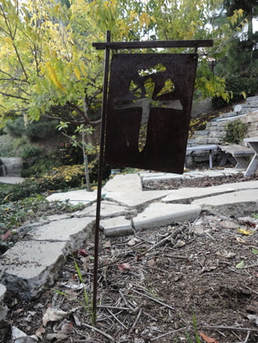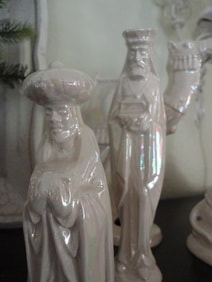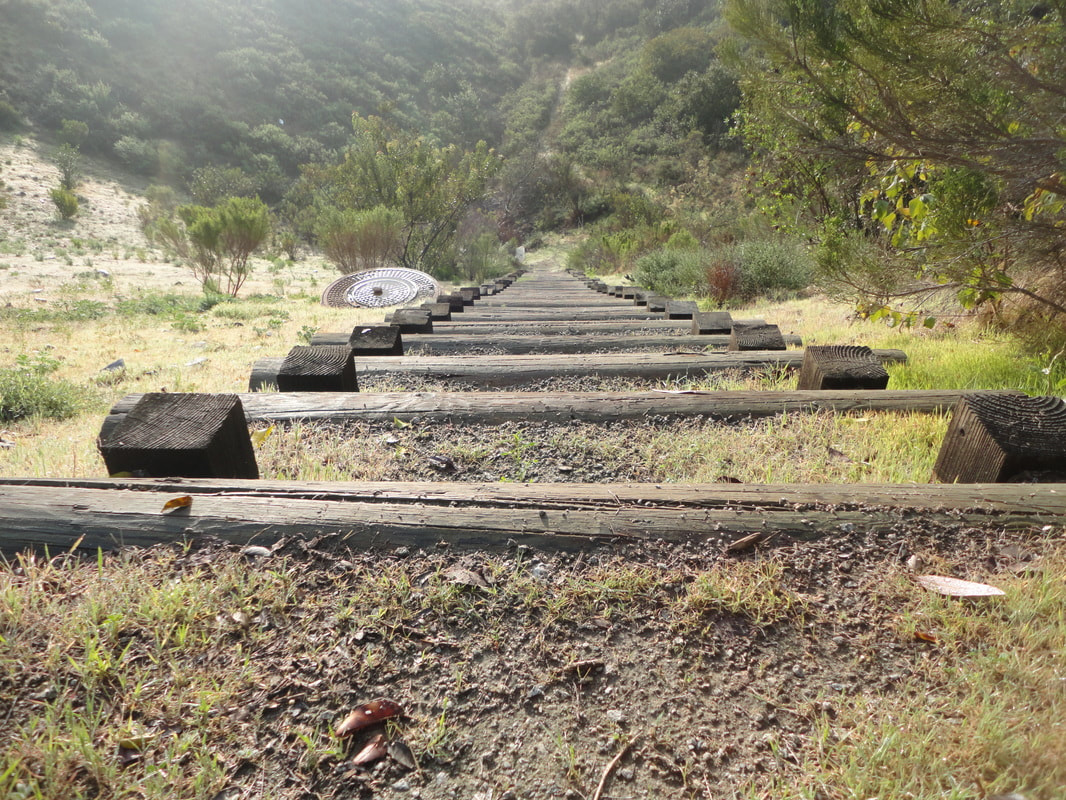resources for your journey with jesus |
|
READ: LUKE 2: 1-7, ISAIAH 9:6-7, ISAIAH 53:3-11, REVELATION 4:1-11 (CLICK ON VERSES TO READ) CLICK HERE FOR A FAMILY VERSION OF THIS DEVOTIONAL CLICK HERE FOR CHILDREN'S ACTIVITY PAGE FOR DEVOTIONAL Have you ever taken the time to think deeply about what happened when the Almighty entered into the womb of a woman? When the Son of God became the Son of man -- flesh and blood, bones and joints, muscle and sinew? I love the picture Daniel Fuller paints in his book, Unity of the Bible, in which he describes the incarnation as a winding staircase, stretching from the glory of heaven down into a battered and broken planet. While God's redemptive plan was in His heart before the foundation of the world, humankind's first glimpse of it is in the stable that reeked of animal dung and moldy straw, where a newborn babe lay shivering in the chill of night, vulnerable in every possible way. To me, the most stunning thing about Christ’s descent from glory was His choice to let go of His role in sharing equality with God. Though in essence He retained His Deity, in experience He chose to give up His rights as God, meaning He had to depend upon His heavenly Father for power or wisdom or guidance or even sustenance. What must it have been like for the all-sufficient Son of God to know that in coming to earth He would be at the mercy of weak and sinful human beings? Can you see Him there, standing on that staircase just before the Spirit placed Him in Mary’s womb? What kinds of thoughts went through His mind? Can you see Him there, standing on that staircase just before the Spirit placed Him in Mary’s womb? From that manger in Bethlehem, Christ’s descent from glory soon continued. His parents became vagabonds, settling as strangers in a foreign land where their livelihood depended upon Egyptians who probably detested them. Later Mary and Joseph would establish their family in Nazareth, a place of derision for its lack of any distinguishing mark, even among the Jews. As Jesus prepared for public ministry in the wilderness fast, the god of the world He’d come to save taunted Him for His fall from power, daring Him to reclaim His rights as the Almighty. He refused, and the descent went on. For the next three years the Son of Man sought to do His Father’s will while sleeping in fields and hills, looking to benevolent women for financial support, seeking solace through prayer in the wee hours of His dark and lonely nights. Scorned by heathens, rejected by the religious elite, living under constant threat of death, the drumbeat of descent pounded out its rhythm day after difficult day. Down and down and down the winding staircase Jesus went, as His closest followers denied and abandoned Him upon His arrest. Then mocked, spat upon, slapped, and scourged to a bloody pulp, He was paraded through the streets like a criminal and hung to die, while His earthly mother looked on in despair. And for six hours on Calvary, the Son of Man descended to the very depths of depravity as He took on the sins of the world, leading to the most painful predicament of all – a severing of relationship with His Father. We will perhaps only grasp the scope of it when we see Him one day on His throne, radiant in splendor, attended by angels and worshipped by saints from every tribe and tongue. This is just a smattering of the descent from glory that awaitd the baby Jesus when He entered our world . We will perhaps only grasp the scope of it when we see Him one day on His throne, radiant in splendor, attended by angels and worshipped by saints from every tribe and tongue. But there could be no better time to ponder such a thing than on Christmas Day, as we celebrate our Lord’s birth. So as we read the Christmas story and exchange our gifts and share our meals, let us take time to remember what it really cost to redeem fallen humankind. May we muse on that manger scene through the prism of glory, where our King reigns over all; His beauty filling the temple of the heavens and splashing out across our world in wonders we are privileged to behold. And as we do, let us bow and worship the One who planned that descent to make us His own long before this world was formed. Worthy are you Oh Lord. REFLECT Today is one of celebration, family, sharing, and fellowship. Take a few minutes to give thanks for all of these things as you ponder that staircase. See Jesus going down it step by step. Read the following passage slowly and prayerfully, asking the Spirit to give you fresh revelation of what it meant for Jesus to humble Himself and become a man. Who, being in very nature God, did not consider equality with God something to be grasped, but made himself nothing, taking the very nature of a servant, being made in human likeness. And being found in appearance as a man, he humbled himself and became obedient to death— even death on a cross! (Philippians 2:6-8) RESPOND Now read the rest of the passage, turning into a prayer of praise and worship for the King of kings and Lord of lords whose birth we celebrate today. Therefore God exalted him to the highest place and gave him the name that is above every name, that at the name of Jesus every knee should bow, in heaven and on earth and under the earth, and every tongue confess that Jesus Christ is Lord, to the glory of God the Father. (Philippians 2:9-11) A CHRISTMAS ACTIVITY Enjoy the day!
4 Comments
READ: LUKE 2:36-38, MATTHEW 5:6, JOHN 6:35 (CLICK ON VERSES TO READ)  Her name was Anna and she was the talk of the town. First there was that temple insanity. Day in and day out she’d practically lived there for as long as anyone could remember. Some claimed her pretense of piety had gone on for decades, ever since her husband died, leaving her a young widow. Praying and fasting, fasting and praying, ignoring priests and prophets, even wellborn Pharisees, who wagged their heads at her foolishness. And now…well it was beyond belief. Just like that, they say she flew out of the temple laughing like a lunatic, cornering anyone crazy enough to listen to her babbling about some baby destined to be the Messiah. What in the world had gotten into her? I find the story of Anna fascinating– three short verses that resonate with joy and intrigue. Luke tells us little about this woman he calls a prophetess, except that she’d been widowed at a young age and had given herself to temple prayer and fasting ever since. She was most likely well into her 60’s or 70’s at the time of her encounter with the infant Messiah. The question that I can’t get away from when I read of this woman’s devotion, is why? What was it that kept Anna coming back day after day, praying… fasting… trusting that what she was doing was not in vain, though it had been centuries since Malachi had uttered the final prophecy about the Christ to come? Perhaps in the beginning it was a way to heal her heart at her husband’s loss, but wouldn’t a year or two have been sufficient to assuage her grief? And surely any ill-placed religious zeal or efforts to earn God’s approval with her piety would have petered out long before as well. The answer might be found in bit of this woman’s heritage. Anna’s father’s name was Phanuel, derived from the altar Jacob built after wrestling all night with an angel. The name meant I have seen God face to face and I have lived (Genesis 32:30). Because names held great significance in the Hebrew culture, family members would have known well the meaning behind that of their patriarch’s. I can just imagine Phanuel holding little Anna on his lap and telling her the story of their forefather Jacob; of how he wrestled with God all night, refusing to let go until he blessed him. Perhaps Phanuel related the tale to the entire family with great dramatic flair, unfolding the details of the interaction that was so intense it put Jacob’s hip out of joint, causing him to limp for the rest of his life. I have seen God face to face...and I have lived. I have seen God face to face and I have lived. The meaning behind Anna's father’s name could well have been a seed that was planted in her young heart, captivating her with the idea that God in heaven sometimes peeled back the veil and allowed mere mortals to encounter Him and be transformed in the process. Perhaps in her most quiet moments as a child, she’d pondered that thought and prayed that one day she too could experience a divine visitation. Then, when she lost her husband at such a young age, her grief may have become like oil thrown upon the flame of desire, igniting her passion to see God like never before. But what had caused it to continue burning so brightly those tens of years later when Mary and Joseph arrived in the Temple that day? I believe it was because there in the shadow of the holy of holies, Anna had tasted of God’s presence and knew from experience that nothing else would ever satisfy her soul. Her life became a testimony of a paradox all Christ’s lovers eventually learn, which is that we can both hunger for the Bread of Life and be filled by His tender touch, all at the same time. This is, in fact, our very destiny – to be both satisfied and yet driven by desire for more of Him, until the day we too see Jesus face to face. Her life became a testimony of a paradox all Christ’s lovers eventually learn, which is that we can both hunger for the Bread of Life and be filled by His tender touch, all at the same time. So as we look at this unique moment in the Christmas narrative, let us remember the woman who wouldn’t let go, the saint whose hunger for God shaped her entire life. May her zeal inspire us with fresh faith once again that God is a rewarder of those who seek Him. And with each foretaste of glory He imparts, let us be reminded that our hunger for Him is a promise of a greater fulfillment yet to come. REFLECT Jesus used the words hunger and thirst to describe the condition of our souls without Him. Why are these metaphors so powerful? Have you ever considered that when you feel a dissatisfaction with the fact that God doesn’t seem as near as you’d like, that this is hunger to drive you to Him even more? That He will both fill you and leave you with hunger at the same time? Write a note to God seeking to describe your own hunger level for Him. RESPOND Now write a prayer of affirmation based upon these words of Jesus: He who comes to me will never go hungry, and he who believes in me will never be thirsty. A CHRISTMAS ACTIVITY As you snack on Christmas goodies and prepare for special meals – shopping, cooking etc. – think about the meaning of food and what Jesus wants it to teach you about His relationship with you. CLICK HERE FOR A FAMILY VERSION OF THE CHRISTMAS DAY DEVOTIONAL CLICK HERE FOR COLORING PAGE FOR FAMILY CHRISTMAS DEVOTIONAL. READ: LUKE 2:22-34, LUKE 18:1-8, HEBREWS 11:6, ROMANS 8:24-25 (CLICK TO READ VERSES)  "Cross my heart, hope to die, stick a needle in my eye." When my best friend Beckee and I said that to each other growing up, we were dead serious about whatever it was we were promising--to keep a secret or stay friends forever or give the class casanova a collective cold shoulder. Cambridge dictionary tells us that people say this to show that what you have just said or promised is completely true or sincere. Here's the thing about promises; they rely on trust, and as such, bind us together in a certain vulnerability. But what if the one making the promise is God? If we take a risk and trust Him, what happens when it feels as if He isn't coming through? When days and weeks and years pass, and still there is no sign that He is keeping His promise? Simeon understood this feeling well. We know little about this man, other than he was righteous before God and devout in the eyes of men, and that at some point God had given him a promise that he would see the Messiah before he died. When Simeon shows up in the Christmas story, he is an old man who has walked with God for many years. But what if the one making the promise is God? If we take a risk and trust Him, what happens when it feels as if He isn't coming through? Simeon's faith reminds me of my favorite parable, the one about the widow who kept coming back and asking for help, until she got it. Jesus says He told us this story for one reason--to keep us from losing heart and giving up. He ends the parable with this powerful promise: Because God hears the cries of His children, He will make what is wrong, right; and He’ll do so speedily. (Of course you have to wonder whatspeedily means to the everlasting God who dwells outside of time). Then Jesus asks this poignant question: When the Son of Man returns, will He find faith on earth? Faith, it turns out, is a precious commodity in God’s economy. Day in and day out, the God of the Universe searches the earth, looking for even the smallest whisper of of a heart that still trusts. Simeon's encounter with the baby Jesus and his parents is, at heart, a story of unfailing faith. He never gave up on the promise, even in the face of impossible odds. Year after year after year, Simeon kept showing up, expecting something to happen. Where did Simeon get this kind of faith? Interestingly enough, the name Simeon comes from a root word that means to hear, which is highly appropriate, because Simeon was a man who listened for God’s voice. Faith, for each of us, is birthed in divine whispers and nourished through intimate communion with our Maker, a secret Simeon had clearly learned. As a result, the aging saint ended up in the right place at the right time for God to fulfill His long awaited promise. Day in and day out, the God of the Universe searches the earth, looking for even the smallest whisper of of a heart that still trusts. But, here's the thing. We don’t know how many days Simeon had listened and heard nothing, or how many nights he lay in bed wondering if God would ever come through. Still, he kept himself in that tender place, ever ready to hear, should the Almighty grant him a word. This, it seems to me, is at the very heart of the kind of faith that makes God smile – ears that are ever tuned to hear His voice, waiting patiently and listening expectantly for Him to speak, even if it might seem the silence has gone on far too long. So in these final moments before Christmas, let us remember a man named Simeon who showed us how to live, by hanging on to God’s promises, listening to His voice and never letting go of the hope of reward. He trusted till the promise was fulfilled, and only then was he ready to leave this world, full of peace. Let us honor the memory of this great saint by listening ourselves for the tender voice of our Lord, so that we too may be granted the gift of persevering faith. REFLECTHow does Simeon’s story speak to you? Is there a promise from God you struggle to hold onto? Do you listen to the Lord as you journey with Him? Come to Him today, offering yourself afresh, asking Him for fresh faith, perhaps for a word that might sustain you in the waiting. RESPONDPonder the reality that faith brings God pleasure, so much so that He waits to reward those who seek Him (Hebrews 11:6). Read the following promises and write prayers of thanksgiving to Him in light of them: Yet he did not waver through unbelief regarding the promise of God, but was strengthened in his faith and gave glory to God, being fully persuaded that God had power to do what he had promised. Romans 4:20-21 For no matter how many promises God has made, they are "Yes" in Christ. And so through him the "Amen" is spoken by us to the glory of God. 2 Corinthians 1:20 For this is contained in Scripture: "BEHOLD, I LAY IN ZION A CHOICE STONE, A PRECIOUS CORNER stone, AND HE WHO BELIEVES IN HIM WILL NOT BE DISAPPOINTED." 1 Peter 2:6 A CHRISTMAS ACTIVITYMake today a day to practice listening to the Lord. In your moments of greatest busyness, plan a timeout where you simply stop, acknowledge God’s presence, ask Him to speak to whatever situation you face at that time, and then wait and listen. You might be surprised at all He has to say! READ: MATTHEW 2:1-2, 9-11, MALACHI 1:11-12, PSALM 141:2, REVELATION 5:8, JOHN 19:38-40 (CLICK ON VERSES TO READ)  My love language is gifts, which according to author Gary Smalley, means that while some people need encouraging words, or acts of service, and others need quality time, or physical touch to feel loved, all I need you to do is give me a present. (When you add that to the fact that it has to be a surprise, you can see the kind of pressure my poor husband lives under!) This probably explains why my favorite part of the Christmas story is when the magi from the east brought gold, frankincense and myrrh to the Christ child, an act that spawned the centuries-old tradition of giving gifts in celebration of His birth. As it turns out, the fact that they brought gifts might be the only detail we get right when we include those wise men in our plays or carols or crèches. Even a cursory read of Matthew’s account of their journey reveals that they were never at the manger, and had to have arrived much later. (I think of that every year when I set out my mother of pearl nativity set, and solve the problem by setting them slightly apart just to prove that I am not Biblically illiterate.) There are however, a few other fallacies about the magi that seem to have become embedded in the Christmas story. All of this then begs the question, how did we end up with these notions about the wise men’s role in the drama of Christ’s birth? For example, the Bible never calls the wise men kings, nor does it tell us where they came from (other than the east), or that they arrived on camels. In fact, nothing indicates that they actually followed a star, although they definitely saw one before they started on their journey, and were filled with great joy when they saw it again as they approached Bethlehem. Though Scripture mentions three gifts, it doesn’t tell us that there were only three magi – there could have been a dozen of them. All of this then begs the question, how did we end up with these notions about the wise men’s role in the drama of Christ’s birth? An in-depth internet search on the subject sent my head spinning. What I discovered is that scholars differ on the source of every one of these things, although many assert their opinions with a great deal of authority. After a frustrating few hours of trying to assimilate the plethora of information out there, I threw up my hands and asked for wisdom from above. When things didn’t get any clearer, it occurred to me that perhaps God never intended for us to ferret out the intricate details of these men’s role in the story, that all along He has left us in the dark for good reason. Why? For one thing, because He is a God of wonder and mystery, and loves to watch us wrestle with His Word and wanting to know more. Let us remember that giving has always been God’s idea, that He does indeed love to give good and perfect gifts to all of His children. But beyond that, the sparsity of details regarding the magi may be meant to point us to the one thing that is beyond dispute, which is that these men from the east brought gifts to the Christ child. Why? Perhaps God wanted us to know how much he delights in giving, indeed that the inclination to bless others is at the very heart of His character. This is an awesome truth. But then, what about the actual gifts? Is there some spiritual symbolism in the gold, frankincense and myrrh? Well, if you like your packages neatly wrapped (no pun intended); even this might be a bit disappointing. Once again, scholars offer a host of ideas about these things, loosly tying them to various Scriptures. While many of these are fascinating to consider, in the end, they are all still, simply ideas. So as we wrap our gifts and tie our bows and enter into the joy of giving this week, let us think about the mystery of those men who traveled far from home, bearing treasures fit for a King. With each present we share – to those we love or to strangers in need – let us remember that giving has always been God’s idea, that He does indeed love to give good and perfect gifts to all of His children. And in the rush of final preparations for Christmas, may we each find at least one quiet moment to kneel before our King as the magi did so long ago, and offer Him that which will bring Him the greatest pleasure – the one thing no one else can give – the love we each have for Him in our hearts. REFLECT While Scripture is not definitive on the symbolism of the gifts the magi brought, it makes a great study, and there are meaningful insights to glean. I have included a few references in the Scripture readings for today. Go back and read them again (click here). Spend some time pondering these three things, asking God to speak to you personally about their meaning for your life today. Ask Him these two questions about each of them: Lord, is there a truth about yourself that You want to captivate my heart with today in regards to this? Lord, is there something about my own life You want to reveal in regards to this? RESPOND Take a few minutes right now to physically kneel before the Lord, imagining what it must have felt like for the magi when they met the Messiah. See yourself giving Jesus the only gift no one else can--the affections of your heart. Know that this gives Him great joy. Rest in the wonder of this. A CHRISTMAS ACTIVITY It’s time to get creative! Consider the three gifts of the magi and try to come up with a way to tell the Gospel story, using these. You could do so through teaching, or even coming up with a fictional story about the three gifts. Share what you come up with over dinner with your family or some friends. READ: MATTHEW 2:1-8, 16-18; LUKE 4:16-21 (CLICK ON VERSES TO READ)  I love Christmas. I always have. This year however, I am keenly aware of how painful holidays are for those whose lives have been upended by disease, disaster or death. From the fires here in California and beyond, to hurricanes and earthquakes across the globe, to the manifold pain of fractured relationships, or lost loved ones, or childhood trauma, many are suffering deeply as we celebrate Christmas. I walk the halls of a facility where my brother must currently call home due to a stroke, and see the loneliness and hurt on weathered faces. For many, the holidays can feel less like a time of celebration and more like an opening of painful wounds. Truth be told, Christmas, as wonderful as it is, so easily amplifies our brokenness. At times, it may even bring out the worst in us. Perhaps this was the case for Herod the great, who was so threatened when magi from the East showed up looking for a would-be king, that he determined to have all baby boys in the region killed. What might have produced such brokenness in one of the most powerful men in the country? It may well have begun in childhood wounds that were never healed. With a Jewish father and Arab mother, Herod fit in nowhere, and was likely bullied by peers on either side as he grew up. Then he watched as his older brother became the favored one in the family, and was given the coveted Jerusalem to rule, while Herod was left with that of Galilee. For many, the holidays can feel less like a time of celebration and more like an opening of painful wounds. We don't know much more about his early years, but by the time Herod was 30, he had fought back, paying his way into the highest levels of Roman government, and as a reward had been made king of Judea. When the Jewish religious leaders called him out for his pagan practices, he abolished their rule and replaced the centuries old inheritance system with one of buying and selling so that he could ensure every priest’s loyalty to Rome. In the process, he had many of them killed, including one who had become like a spiritual father to him. Though Herod had several wives, his greatest love was a beautiful Hasmonean princess named Miriamne. For no apparent reason, he began to suspect her of having an affair, and being riddled with jealousy, brought charges against her. Miriamne was executed after he bribed his own sister to testify against her. Many suspected the real problem was that Miriamne had greater favor with the Jews than he did, something he could not bear. History suggests that shortly after this event, Herod lost his mind and never fully recovered. Throughout the 37 years of Herod's monarchy, his cruelty cast a long dark shadow over his accomplishments, one that remains to this day. When he realized that he was facing his final hours, he demanded that all Jews be rounded up and executed, so that the nation would have reason to mourn upon his death. In the end, his sister Salome released the thousands of Jews from the Hippodrome, preventing a massacre of immeasurable proportion. As Christmas carols fill the air and warm fires burn in our decorated living rooms, let us not forget this dark page in the story of Christ’s birth. As Christmas carols fill the air and warm fires burn in our decorated living rooms, let us not forget this dark page in the story of Christ’s birth. May Herod remind us of the pain that often lies beneath our own brokenness and that of others. As we celebrate this year, may our hearts soar with wonder that Emmanuel came to bring God’s favor – a favor that can save and heal, that can set captives free and lead the oppressed to liberty. And in remembering, let us receive afresh the babe who grew up to crush the bars and rescue you and me, and now stands ready to bind our broken hearts, heal our hidden hurts and restore our souls to wholeness once again. REFLECT Read the following words of Jesus slowly and meditatively (to meditate means to turn something over and over in your mind again and again, like looking at all the facets and prisms in a beautiful diamond): The scroll of the prophet Isaiah was handed to him. Unrolling it, he found the place where it is written: "The Spirit of the Lord is on me, because he has anointed me to preach good news to the poor. He has sent me to proclaim freedom for the prisoners and recovery of sight for the blind, to release the oppressed, to proclaim the year of the Lord's favor." Then he rolled up the scroll, gave it back to the attendant and sat down. The eyes of everyone in the synagogue were fastened on him, and he began by saying to them, "Today this scripture is fulfilled in your hearing." Luke 4:17-21 RESPOND Spend a few minutes pondering what your life would have been like had Jesus not set you free. Don’t rush past this – what kind of mental prison might you be living in now if He hadn’t? Are there any areas you need His healing for this Christmas? Offer it honestly to the Lord, and ask Him to meet you right where you are at. Receive His favor. Read the above passage one more time and affirm that it is true for you personally as you wait in His presence. Then worship the King of grace. A CHRISTMAS ACTIVITY Though we are all broken in many ways, some of those who suffer most can be found in mental wards and on the streets – people who’ve lost touch with reality and know no way out. Pray for God’s direction and do an act of practical kindness. Bring a stocking to someone in a hospital mental ward or offer a cup of coffee or some Christmas goodies to a homeless person who seems lonely or confused. |
Tricia McCary RhodesAuthor of 7 books and pastor of Global Leadership Development at All Peoples Church in San Diego, Tricia specializes in helping others experience God’s presence through practicing soul-care. Archives
February 2024
|


 RSS Feed
RSS Feed